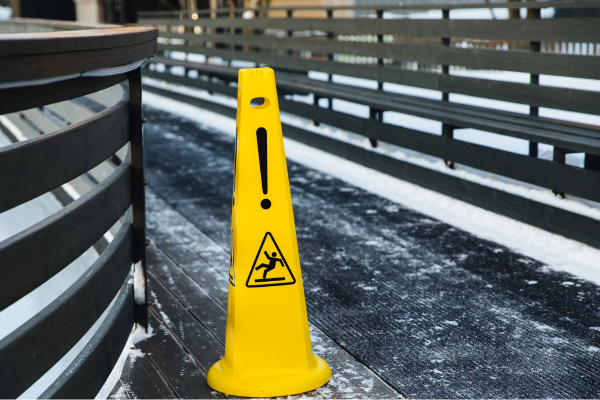
Slip-and-fall accidents can happen anywhere—a grocery store, a hotel lobby, a parking garage, or even a public sidewalk. But when someone gets injured, one of the key technical questions that often arises is: What is the coefficient of friction, and why does it matter?
If you’re pursuing a personal injury claim, understanding this term could make or break your case.
What Is the Coefficient of Friction?
The coefficient of friction (COF) is a scientific measurement that describes how slippery—or grippy—a surface is. It’s a number between 0 and 1 that indicates the amount of resistance between two surfaces when one moves over the other. The higher the number, the more traction the surface provides. The lower the number, the more slippery it is.
For example:
- 0.9 = very safe, high traction (like a dry rubber mat)
- 0.6 = generally considered safe for walking
- 0.3 or lower = slippery and potentially dangerous
In slip-and-fall cases, this measurement helps determine whether the property owner maintained a safe walking surface.
Why Does the Coefficient of Friction Matter in a Slip-and-Fall Case?
In personal injury law, one of the central questions is liability: Was the property owner or manager negligent in maintaining a reasonably safe environment?
If the floor where the fall happened had an unsafe coefficient of friction, that can be powerful evidence to show the property wasn’t maintained properly. For example:
- Was the floor wet or oily without warning signs?
- Was the flooring material itself unreasonably slick?
- Was there worn-out tile, unpolished stone, or wax buildup?
If testing shows the surface had a COF lower than what safety standards recommend (typically 0.5 or higher for walkways, according to OSHA and ANSI), that supports a claim of negligence.
How Is It Measured?
Experts use specialized tools, like a tribometer, to test a surface’s slip resistance. These devices simulate the motion of a footstep and measure the force needed to start sliding.
There are different methods used depending on the location and type of flooring:
- Dry vs. Wet Testing: Surfaces may pass when dry but fail badly when wet—this is especially important in bathrooms, kitchens, or outdoor areas.
- Static vs. Dynamic COF: Static COF measures the force needed to start sliding, while dynamic COF measures the force needed to keep sliding. Both are relevant.
These test results can become critical evidence in a slip-and-fall lawsuit.
When Should COF Be Investigated?
If you’ve been injured in a fall and believe unsafe conditions contributed to the accident, it’s important to act quickly. Over time, evidence can be lost. Floors can be cleaned, resurfaced, or replaced, making it harder to prove what happened.
That’s why you should consult a personal injury attorney as soon as possible. An experienced legal team can bring in safety engineers or building code experts to measure the coefficient of friction and determine if the surface failed to meet safety standards.
Proving Negligence with Slip Resistance Data
Let’s say a customer slips on a freshly mopped grocery store aisle that had no warning signs. If the COF is tested and comes back significantly below acceptable safety thresholds, that data can support a case that the store failed to provide a safe walking environment.
These scientific findings, paired with witness statements, surveillance footage, and medical records, can help demonstrate in court that the fall was foreseeable and preventable.
Bottom Line
The coefficient of friction may sound like a technical term, but it plays a big role in real-world personal injury claims. If you’ve been injured in a slip-and-fall accident, understanding how slippery the surface was can help determine whether the property owner is at fault.
If you or a loved one has been hurt in a fall, don’t wait. Contact an attorney immediately.
Contact a Florida Personal Injury Lawyer
If you have been involved in a personal injury incident, seeking legal advice is essential to protect your rights. Our legal team has more than 40 years of experience seeking justice for accident victims. Our attorneys have sought and won millions of dollars for our injured clients.
Call 850-601-1111 to schedule a complimentary consultation with no obligations. This consultation will help you explore your legal options. Let us help you fight for fair compensation.


